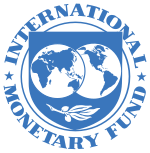International Monetary Fund

coat of arms
|
|
| Abbreviation | IMF |
|---|---|
| Formation | 27 December 1945 |
| Type | International financial institution |
| Purpose | Promote international monetary cooperation, facilitate international trade, foster sustainable economic growth, make resources available to members experiencing balance of payments difficulties |
| Headquarters | Washington, D.C., United States′ |
| Coordinates | 38°53′56.42″N 77°2′39.21″W / 38.8990056°N 77.0442250°WCoordinates: 38°53′56.42″N 77°2′39.21″W / 38.8990056°N 77.0442250°W |
|
Region
|
Worldwide |
|
Membership
|
189 countries |
|
Official language
|
English |
|
Managing Director
|
Christine Lagarde |
|
Main organ
|
Board of governors |
|
Parent organization
|
United Nations |
|
Staff
|
2,700 |
| Website | www |
The International Monetary Fund (IMF) is an international organization headquartered in Washington, D.C., of "189 countries working to foster global monetary cooperation, secure financial stability, facilitate international trade, promote high employment and sustainable economic growth, and reduce poverty around the world." Formed in 1944 at the Bretton Woods Conference primarily by the ideas of Harry Dexter White and John Maynard Keynes, it came into formal existence in 1945 with 29 member countries and the goal of reconstructing the international payment system. It now plays a central role in the management of balance of payments difficulties and international financial crises. Countries contribute funds to a pool through a quota system from which countries experiencing balance of payments problems can borrow money. As of 2016[update], the fund had SDR 477 billion (about $668 billion).
Through the fund, and other activities such as the gathering of statistics and analysis, surveillance of its members' economies and the demand for particular policies, the IMF works to improve the economies of its member countries. The organization's objectives stated in the Articles of Agreement are: to promote international monetary cooperation, international trade, high employment, exchange-rate stability, sustainable economic growth, and making resources available to member countries in financial difficulty.
According to the IMF itself, it works to foster global growth and economic stability by providing policy, advice and financing to members, by working with developing nations to help them achieve macroeconomic stability and reduce poverty. The rationale for this is that private international capital markets function imperfectly and many countries have limited access to financial markets. Such market imperfections, together with balance-of-payments financing, provide the justification for official financing, without which many countries could only correct large external payment imbalances through measures with adverse economic consequences. The IMF provides alternate sources of financing.
...
Wikipedia
